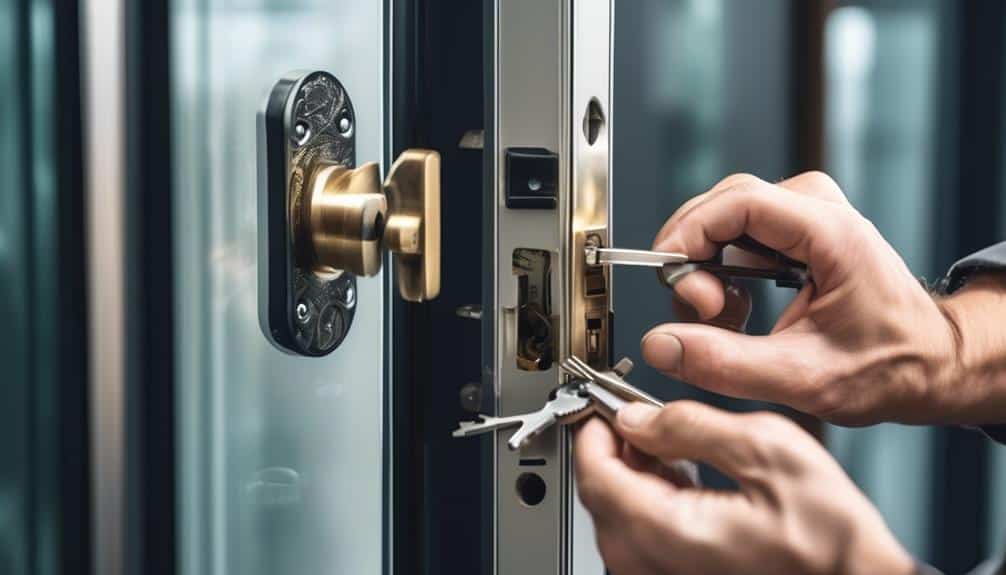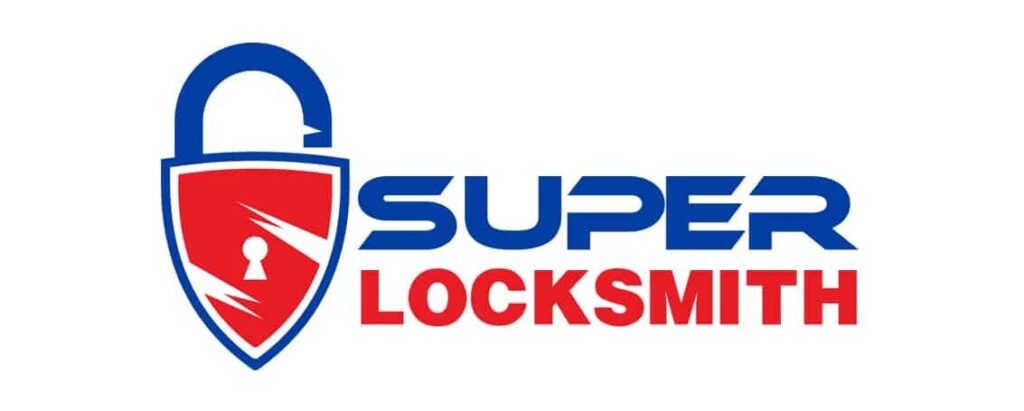Are you concerned about the security of your business premises? As professionals in the field, we understand the importance of ensuring that your commercial locks are installed correctly and provide the necessary level of protection.
In this discussion, we will share essential tips on commercial lock installation that every business owner should be aware of. From selecting the right type of locks to troubleshooting common installation issues, we will cover all the necessary steps to help you safeguard your business.
So, let's dive in and discover the key to enhancing your business security.
Types of Commercial Locks
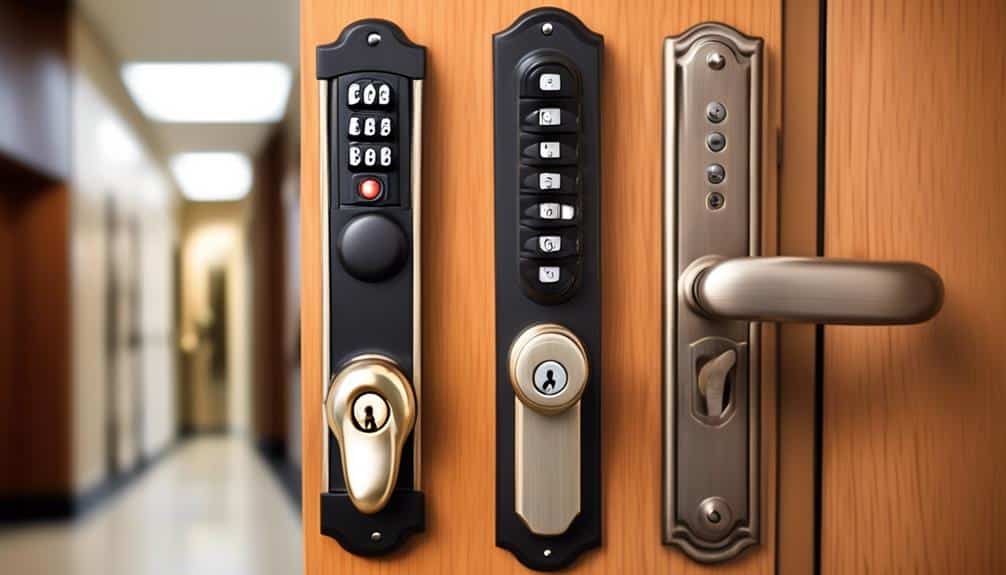
When it comes to securing your business premises, it's crucial to understand the various types of commercial locks available to ensure the utmost security and protection.
One popular type of commercial lock is the electronic lock. Electronic locks offer numerous benefits for businesses. They provide keyless entry, eliminating the need for physical keys that can be lost or stolen. With an electronic lock, access can be granted or revoked remotely, allowing for convenient and efficient management of entry permissions. Additionally, electronic locks often have built-in audit trails, which can track and record who enters and exits the premises, enhancing accountability and security.
Another type of commercial lock worth considering is the keyless entry system. Keyless entry systems offer enhanced security by eliminating the vulnerabilities associated with traditional keys. These systems use technologies such as keypads, biometrics, or proximity cards to grant access. Best practices for keyless entry systems include regularly updating access codes or credentials, implementing multi-factor authentication, and ensuring that the system is regularly maintained and tested for any potential vulnerabilities.
Understanding the benefits of electronic locks and implementing best practices for keyless entry systems are essential for businesses looking to enhance their security measures. By investing in the right commercial locks, businesses can safeguard their premises, assets, and employees, providing peace of mind and protecting against potential security breaches.
Factors to Consider Before Installation
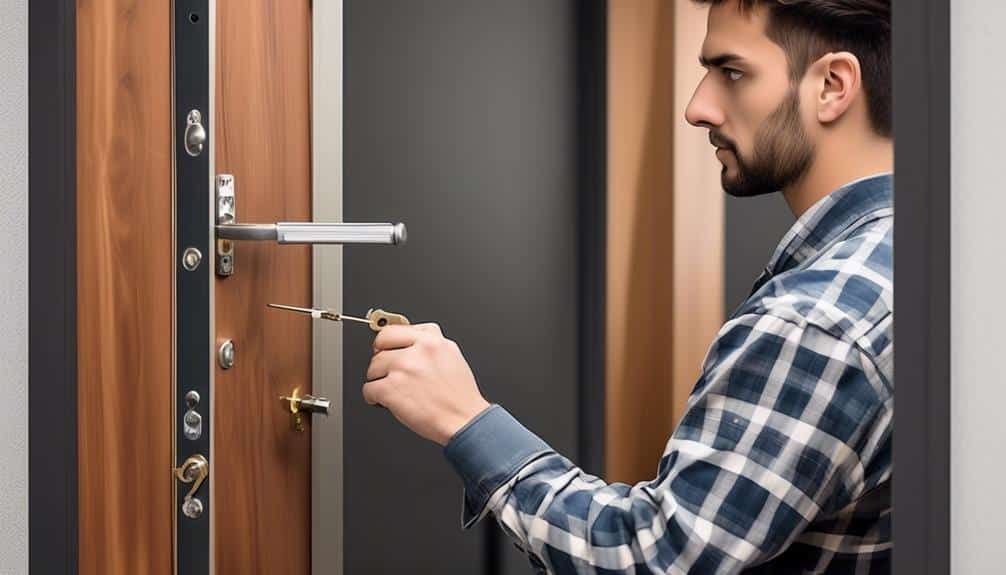
Before proceeding with the installation of commercial locks, we must assess our security requirements. This involves evaluating the level of protection needed for our premises and identifying any specific vulnerabilities.
Once we've determined our security needs, we can then select the appropriate type of lock that will meet those requirements.
It's crucial to consult with a professional locksmith during this process to ensure that we make informed decisions and install locks that provide optimal security for our business.
Security Requirements Assessment
To ensure optimal security for your business, it's crucial to thoroughly assess the specific requirements before proceeding with the installation of commercial locks.
One important factor to consider is security system integration. It's essential to evaluate how the new commercial locks will integrate with your existing security system. This includes determining if the locks can be easily connected and controlled through your current security infrastructure.
Additionally, you should evaluate the compatibility of the locks with keyless entry options. Keyless entry systems offer convenience and enhanced security, so it's important to assess if the commercial locks can support these options.
Lock Type Selection
We carefully consider various factors before selecting the appropriate lock type for installation in order to ensure optimal security for businesses.
- Lock Brand Recommendations:
- We recommend choosing a reputable lock brand that has a proven track record of quality and reliability. Brands such as Schlage, Kwikset, and Yale are known for their durability and advanced security features.
- It's important to select a lock brand that offers a wide range of options to cater to the specific needs of your business, whether it's high-security locks for sensitive areas or keyless entry systems for convenience.
- Lock Installation Tools:
- To ensure a proper installation, it's essential to have the right tools. Some common tools include a drill, screwdrivers, chisels, and a measuring tape.
- Additionally, specialized tools like lock installation kits and templates can greatly simplify the installation process and ensure precision and accuracy.
Professional Locksmith Consultation
After carefully considering various factors, including the specific security needs of your business, a professional locksmith consultation is essential before proceeding with lock installation. Professional locksmith services offer expertise and knowledge in securing commercial properties effectively.
During the consultation, the locksmith will assess your business premises, evaluate the existing security measures, and determine the most suitable lock types for your specific needs. They'll consider factors such as the level of security required, the layout of the building, and the type of entry points.
Choosing the Right Locksmith
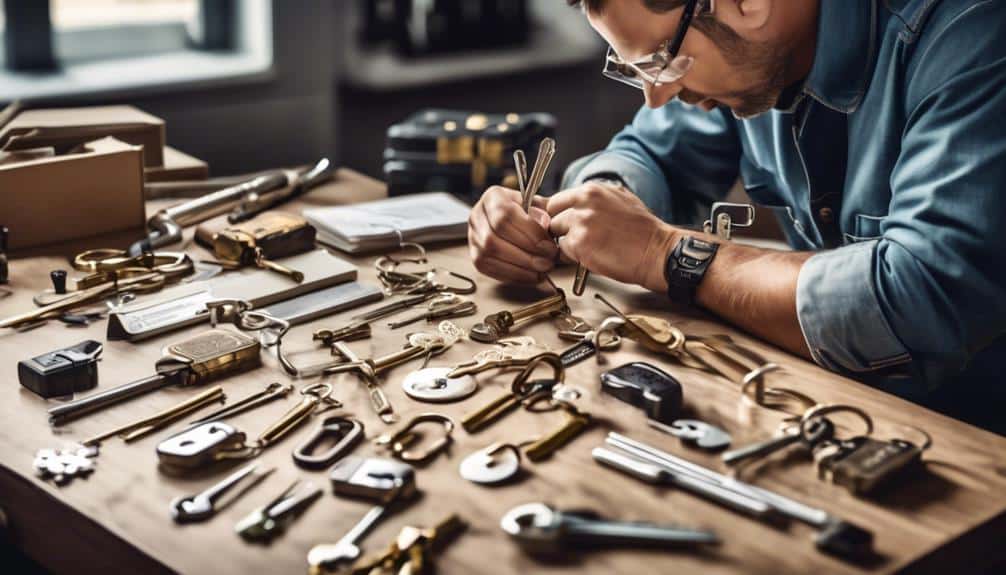
When choosing the right locksmith for commercial lock installation, it's crucial to consider their expertise in commercial locks. We want a locksmith who specializes in commercial locks and understands the unique security needs of businesses.
Additionally, we should verify their professional locksmith credentials to ensure they've undergone proper training and have the necessary qualifications.
Lastly, it's important to select a locksmith with experience in business security to ensure they're knowledgeable about the specific challenges and regulations surrounding commercial properties.
Expertise in Commercial Locks
To ensure the highest level of security for your business, it's crucial to select a locksmith who possesses expertise in commercial locks and can provide reliable and efficient installation services.
When it comes to commercial locks, having a locksmith with expertise in keyless locks is invaluable. These locks offer advanced security features such as biometric recognition and access control systems, ensuring that only authorized personnel can enter your premises.
Additionally, electronic locks provide numerous benefits, including enhanced convenience, as they eliminate the need for physical keys. They also provide a comprehensive audit trail, allowing you to track and monitor access to your business at all times.
Professional Locksmith Credentials
Having established the importance of selecting a locksmith with expertise in commercial locks, it is crucial to now focus on the necessary professional credentials to consider when choosing the right locksmith for your business. Professional locksmith training and certification requirements play a vital role in ensuring the competence and reliability of a locksmith. When evaluating potential locksmiths, it is essential to inquire about their training and certification. Look for locksmiths who have undergone comprehensive training programs that cover various aspects of locksmithing, including commercial lock installation and maintenance. Additionally, check if they hold any certifications from recognized industry organizations or associations. These credentials serve as a testament to their knowledge and skills in the field. By selecting a locksmith with the appropriate professional credentials, you can have peace of mind knowing that your business is in capable hands.
| Professional Locksmith Credentials | Importance |
|---|---|
| Professional locksmith training | Ensures proper knowledge and skills |
| Locksmith certification requirements | Demonstrates competence and reliability |
Experience With Business Security
To ensure the security of your business, it's imperative to select a locksmith with extensive experience in business security systems. When it comes to business security challenges, an experienced locksmith understands the unique needs and vulnerabilities that businesses face. They're well-versed in implementing security protocols that are tailored to your specific industry and location.
Here are two key reasons why experience with business security is crucial when choosing a locksmith:
- In-depth knowledge of commercial-grade locks: A locksmith with business security expertise will have a deep understanding of the different types of commercial-grade locks available in the market. They can recommend and install the most appropriate lock systems that can withstand potential threats and deter unauthorized access.
- Familiarity with security regulations and compliance: Business security goes beyond just installing locks. It involves adhering to industry-specific security regulations and compliance standards. A locksmith experienced in business security will be well-versed in these requirements and can help ensure that your security measures meet all necessary criteria.
Choosing a locksmith with extensive experience in business security will give you peace of mind knowing that your business is protected against potential threats.
Preparing the Door for Installation
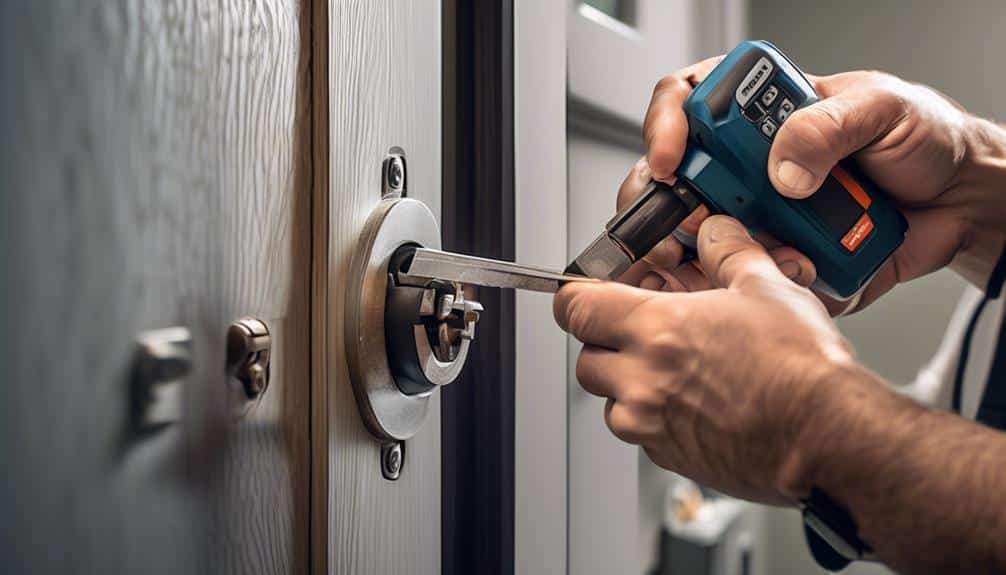
Before installing a commercial lock, it's crucial to properly prepare the door to ensure a secure and seamless installation process. This involves taking accurate door measurements and conducting a thorough inspection of the door frame.
To start, measuring the door is essential to ensure the lock fits correctly. Measure the height, width, and thickness of the door to determine the appropriate lock size. Keep in mind that commercial doors may have specific requirements, such as fire ratings or ADA compliance, which may affect the type of lock you can install.
Once the measurements are taken, inspect the door frame for any damage or misalignment. Check for cracks, rotting wood, or loose hinges, as these issues can compromise the security of the lock. If any problems are found, they should be addressed and repaired before proceeding with the installation.
Additionally, make sure the door is properly aligned with the frame. Check for gaps or unevenness, as these can affect the lock's performance. Adjust the frame if necessary to ensure a proper fit.
Proper Alignment and Positioning of the Lock
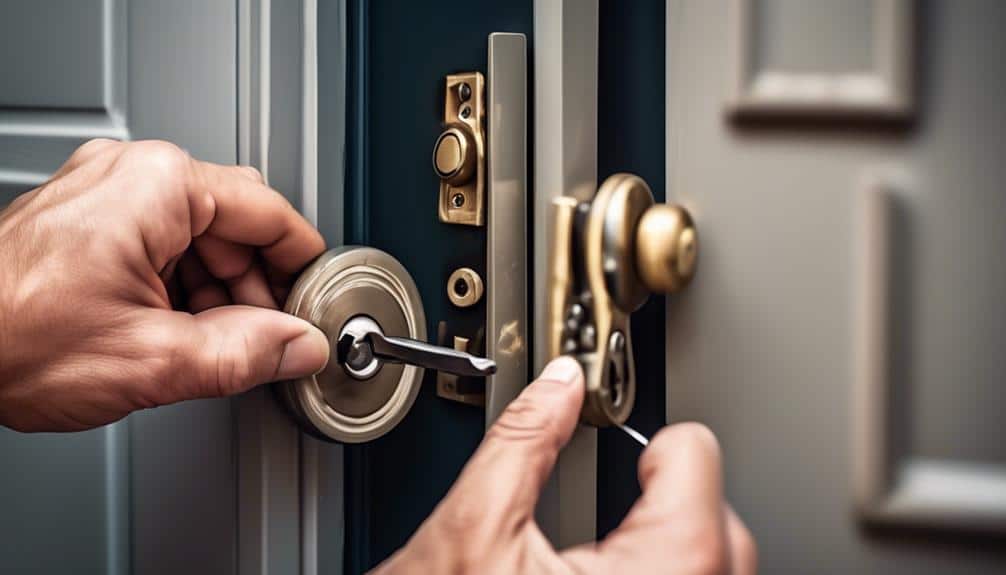
We carefully align and position the lock to ensure optimal functionality and security. Proper alignment and positioning are crucial steps in the lock installation process as they directly impact the lock's performance and overall security of the door. To achieve this, we utilize proper measurement tools and follow a systematic approach. Here's how we ensure the lock is aligned and positioned correctly:
- Measurements: Before installation, we take precise measurements of the door and the lock to determine the exact placement. This helps us ensure that the lock fits perfectly within the door frame and aligns with the latch mechanism. We use a tape measure to measure the dimensions of the door and the lock accurately. Additionally, we use a level to ensure that the lock is aligned horizontally and vertically, providing a balanced and secure fit.
- Door Frame Preparation: Proper preparation of the door frame is essential for the lock's alignment and positioning. We carefully examine the door frame, ensuring it's clean and free from any debris or obstructions that could hinder the lock's installation. If necessary, we make adjustments to the door frame, such as removing excess material or reinforcing weak areas, to ensure a secure and stable foundation for the lock.
Ensuring Proper Security Measures
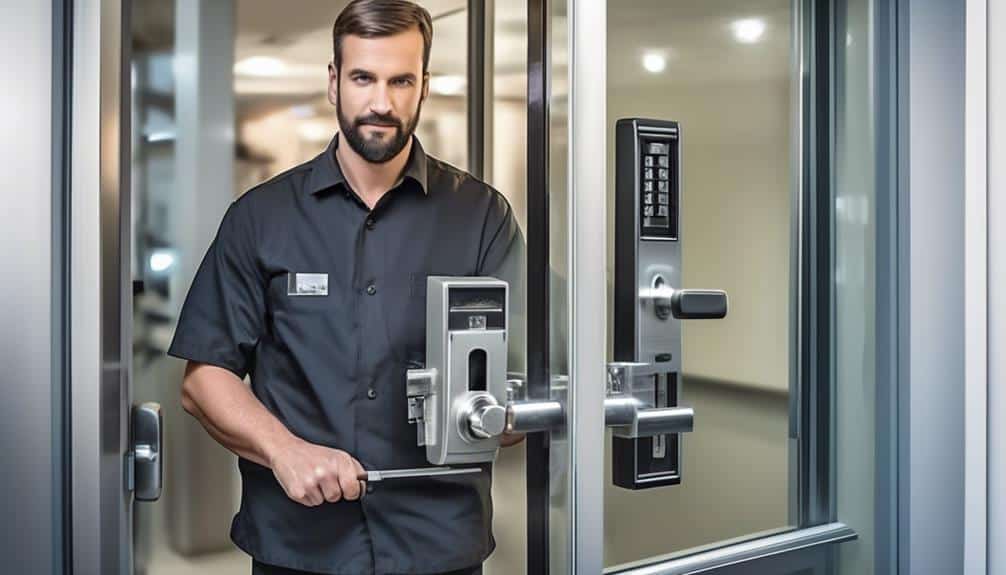
Ensuring optimal security measures is a critical aspect of commercial lock installation for businesses. It isn't enough to simply install a lock; regular lock maintenance and addressing common security vulnerabilities are essential to maintain the safety and integrity of a commercial building.
Regular lock maintenance is of utmost importance to ensure that the locks are functioning properly. This includes lubricating the lock mechanism, inspecting for any signs of wear or damage, and replacing worn-out parts promptly. By conducting regular maintenance, businesses can prevent lock malfunctions and potential security breaches.
Commercial buildings are prone to certain security vulnerabilities that need to be addressed during lock installation. These vulnerabilities include:
- Weak entry points: Doors and windows that aren't properly reinforced can be easily compromised. Reinforcing them with additional locks, security bars, or shatterproof glass can significantly enhance security.
- Lack of access control: It's crucial to have a comprehensive access control system in place, such as key card or biometric systems, to limit access to authorized personnel only.
- Inadequate surveillance: Installing security cameras and alarm systems can act as deterrents and provide evidence in case of a security breach.
Testing and Maintenance of Installed Locks
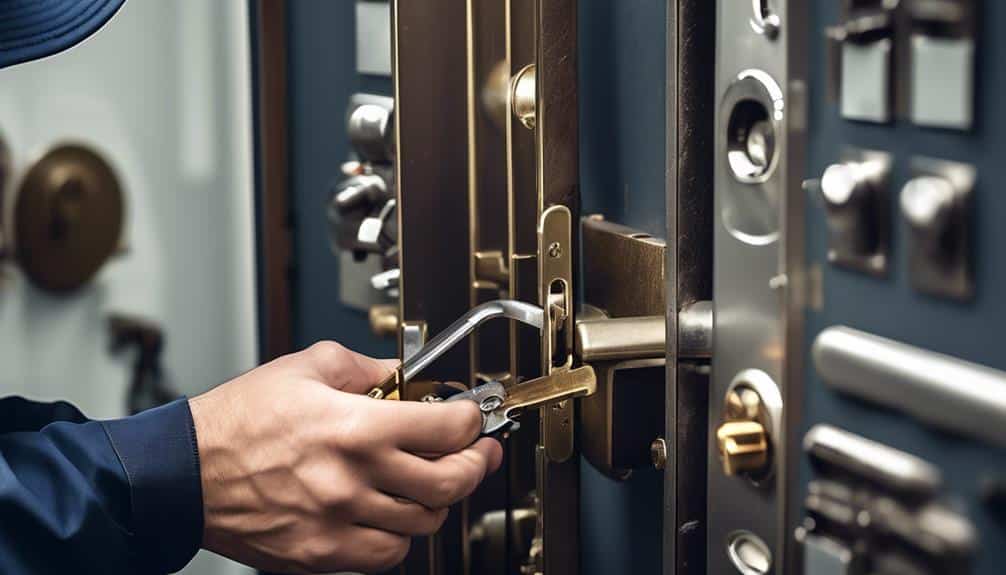
Regular testing and maintenance of installed locks is crucial to ensure their continued functionality and effectiveness in providing security for commercial buildings. Without proper upkeep, locks can become worn out or malfunction, leaving the premises vulnerable to unauthorized access.
To ensure the reliability of installed locks, it's essential to follow strict testing procedures and perform regular maintenance. Here are some important considerations:
- Testing Procedures:
- Conduct regular lock function tests to ensure smooth operation and identify any potential issues.
- Test the lock's resistance to forced entry by applying pressure or attempting to pick the lock.
- Regular Maintenance:
- Clean the lock mechanism and remove any debris or dirt that could impair its performance.
- Lubricate the lock regularly to prevent rusting and ensure smooth operation.
- Inspect and replace worn-out parts, such as springs or tumblers, to maintain optimal functionality.
- Verify the alignment of the lock with the strike plate to ensure a proper fit and secure locking.
Troubleshooting Common Lock Installation Issues
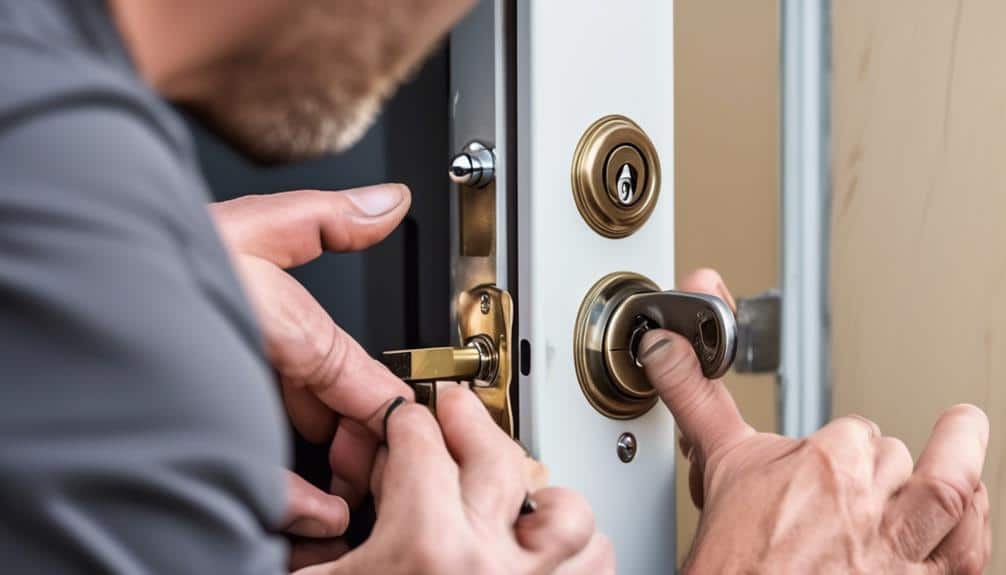
To effectively troubleshoot common lock installation issues, it's important to have a thorough understanding of the key components and potential challenges that may arise during the installation process. Troubleshooting lock issues requires careful examination of the lock mechanism, the strike plate, and the alignment of the door and frame.
One common lock problem is misalignment. This occurs when the lock doesn't properly engage with the strike plate, causing difficulty in locking or unlocking the door. To fix this issue, check the alignment of the strike plate and adjust it if necessary. Ensure that the lock is correctly installed and that the door and frame are properly aligned.
Another common issue is a loose lock. If the lock feels loose or wobbly, it could be due to loose screws or faulty installation. Tighten the screws that secure the lock to the door to ensure a secure fit.
Key sticking is also a common problem. If the key doesn't turn smoothly in the lock or gets stuck, it could be due to dirt or debris inside the lock mechanism. Clean the lock and lubricate it with graphite powder to resolve this issue.
Frequently Asked Questions
What Are Some Common Security Measures That Businesses Should Consider When Installing Commercial Locks?
When installing commercial locks, there are several common security measures that businesses should consider.
One important aspect is the use of high-quality locks that are resistant to picking, drilling, and other forced entry techniques.
Additionally, businesses should prioritize the installation of security features such as deadbolts, strike plates, and reinforced door frames.
It's crucial to hire professionals for lock installation to ensure proper alignment and functionality.
Professional installation guarantees that all security measures are correctly implemented to protect the business premises effectively.
How Often Should Businesses Test and Maintain Their Installed Locks?
Testing frequency and maintenance schedule are key factors to consider when ensuring the security of our installed locks. Regular testing, at least once every six months, allows us to identify potential weaknesses or malfunctions.
What Are Some Potential Issues That Can Arise During the Installation of Commercial Locks?
When installing commercial locks, potential challenges may arise. These can include misalignment of the lock mechanism, difficulty in fitting the lock into the door frame, or issues with the electrical wiring if it's an electronic lock.
To troubleshoot these problems, it's important to carefully read the installation instructions, use proper tools, and ensure that the door frame is properly prepared.
Additionally, testing the lock after installation is crucial to identify any issues and make necessary adjustments.
Are There Any Specific Regulations or Standards That Businesses Should Be Aware of When Installing Commercial Locks?
When installing commercial locks, businesses should be aware of specific regulations and standards. These guidelines ensure the proper installation of locks to maintain security and safety.
Regulations may vary depending on the location and industry, but they typically cover aspects such as fire safety, accessibility, and building codes. Compliance with these regulations is essential to avoid penalties and liability issues.
Additionally, following industry standards guarantees the use of high-quality materials and techniques for reliable lock installation.
Can Businesses Install Commercial Locks on All Types of Doors, or Are There Certain Limitations or Requirements to Consider?
Certainly!
When it comes to commercial lock installation, there are indeed limitations and requirements to consider. Depending on the type of door, certain locks may not be suitable or even compatible. Factors such as door material, thickness, and security needs can greatly impact the choice of locks.
Additionally, building codes and regulations may dictate specific requirements for commercial locks. Therefore, it's crucial for businesses to thoroughly assess their door types and consult with professionals to ensure proper installation and compliance with all applicable limitations and requirements.

